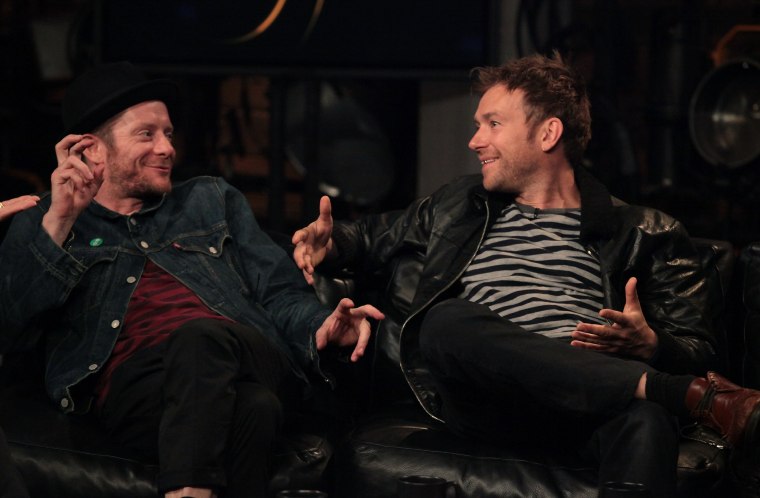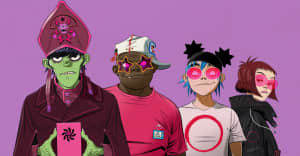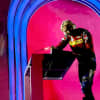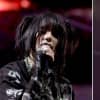 Jamie Hewlett (left) and Damon Albarn in 2010.
Astrid Stawiarz
/
Getty
Jamie Hewlett (left) and Damon Albarn in 2010.
Astrid Stawiarz
/
Getty
We sat down with Damon Albarn and Jamie Hewlett, the masterminds behind the ever-expanding Gorillaz, and two affable chaps with great taste in footwear. They'd just arrived in New York after a volcano-depleted but still mindblowing set at Coachella, so we asked them about that, playing with their heroes, and Wayne Rooney's ankle.
I wanted to start by asking you what your opinions of Coachella were.
JAMIE HEWLETT: Great. I thought it was – it’s funny, a festival on a golf course with lots of people in golf caddies, and extremely well organized down to the finest detail. But we didn’t go for the whole festival, we arrived on the Sunday with our kids, riding around in some golf carts and had food and caught the end of fun fair and back in time for the concert, which I thought was great. Just the reaction from the crowd was extremely exciting, to be sort of set amongst everyone. The thing that amazed me the most is when it started it was like a sea of little blue camcorder screens and everyone was like going like this [holds up hands] and watching it through the recorder while they were recording. You could see just thousands of people with these tiny blue screens. But the crowd reaction was really quite amazing and I think it really worked, the show.
How did it compare to the big British festivals? Did you guys go to those when you were younger?
HEWLETT: I’ve been, yeah, many times over the years. Well there’s nothing like Glastonbury, Glastonbury’s just a stormy mess.
DAMON ALBARN: Yeah Glastonbury’s really quite something. There’ll never be another festival like that. It’s where it is, it’s some ancient, Neolithic, magical site that’s just got such history, such a geography of it. These big hills which it sits on. I don’t know, it’s a special place. But I mean, Coachella was great. What I love about Coachella is that wind you get at night. Love that. So it’s kind of nice. It’s very dramatic.
How many people do you bring with you to stuff like this?
ALBARN: A lot. Especially with this album, it’s huge. We would have had more if the volcano hadn’t interrupted our week.
So how many more people were supposed to be there?
ALBARN: Another ten or eleven people were missing from the stage.
That volcano. I was just thinking that it must feel timely to have all this dramatic climate stuff happening as Plastic Beach is out because it has such a sense of doom, a little bit apocalyptic.
ALBARN: If it’s ever a good time to play a record like that, I suppose. There’s always a bit of a time and place to launch it you know, because it resonates — it does resonate. What blew me away, and I’ve done a lot of festivals in my time, was the response to the new material. It was great. Best reception I’ve ever experienced in America in 20 years.
You were spotted watching the screens as you played the songs. Do you have cues set up in the video to guide you through the set?
ALBARN: I’d love to say yes. We just rehearsed it. It’s a lot of rehearsal that goes into it. We did a little tour with just the band, really small venues in England in the back of a van, just so we could grind through the repetition of getting that. Because you know when you’re playing to clicks [click tracks], for it to sound natural you’ve got to know it so well.
So how many times have you played with the new album?
HEWLETT: It was the first time we’ve done everything together.
ALBARN: So I thought we did pretty well considering. It could’ve been a lot worse, put it that way.
What is it like to play with a good portion of The Clash and Bobby Womack? It seems like you definitely went and tried to get some of the guys you liked from way back.
ALBARN: Yeah, you know you’re going to want people if they’re interesting and clever and if I like them, that’s what it’s about.
But it seems like these are kind of more or your heroes than previous Gorillaz albums.
ALBARN: You got me.
HEWLETT: We’re more at the point now where Gorillaz is well known enough that maybe we can be a little bit cheeky.
ALBARN: Well you know just because they’re your heroes there’s no guarantee that it’s going to work when you actually go into the studio. It’s not guaranteed. And there’s a lot of people who we’ve asked who haven’t done it.
“If you you can get into the imaginations of the new young generation discovering pop music, it will definitely resonate and be carried with them forward.”—Damon Albarn
Do you pick these collaborators to be more on the pop side because you’ve done the Africa stuff?
ALBARN: When I finished, I was thinking, why aren’t there more of our mates from Africa on the record? You know there’s 18 pieces of music on this record, some of it was made in different languages, very different, obviously different styles, but I just tried to, I had to edit it. I couldn’t put out 70 pieces of music, it’d be like four albums, it’d be massive.
For some people that might be fine.
ALBARN: Well the world is not ready for a quadruple concept album, is it really?
HEWLETT: For a while we were thinking about a triple album, weren’t we? Then we realized that people just don’t listen. It’s hard enough to get them to listen to an album, and that’s why I think a lot of people put out albums with sort of crappy songs and a couple of singles because they know no one’s going to listen to it anyway. We very much wanted it to be something that you do listen to from beginning to end and had a narrative that was important. But three sides, you can’t even get people from the record companies to listen to it from beginning to end.
ALBARN: Yeah but I mean, there’s still a lot we can do with the material.
HEWLETT: There’s another two albums of virtually finished songs that are incredible, so we can do something with them.
How long was the process?
ALBARN: Two, three years.
HEWLETT: It was two years. And of course it will go on, hopefully it will go on. This time next year, we hope to keep pushing this album in singles, videos and touring.
Who started the process?
HEWLETT: We started at exactly the same time, pretty much. He starts making songs, and I start thinking. And then he said to me, probably about three weeks after we started, “I wanna call it Plastic Beach. And that was the sort of catalyst for everything.
ALBARN: It’s quite frightening to get into that moment where you haven’t actually seen what it is. And we weren’t sure what it was, and then we were really sure what it was.
HEWLETT: And a few things weren’t really working, but when he said “plastic beach” it suddenly just went ding dong. And I went okay, we can do so much with that.
Do you think people get that sense of the apocalypse, the climate, the issues, the politic when they listen to it?
HEWLETT: People who listen to it, people might go "What is that shit? Plastic what? We should have a plastic tour then? So pretentious, so stupid." So you know, that’s inevitable.
Is it important to you that they get it?
ALBARN: I think a lot of the idea is that you can kind of get into the imaginations of the new young generation that might be suddenly discovering pop music. If you can get in, that’s interesting because it will definitely resonate and be carried with them forward. So they’re the only ones who will probably be affected by that aspect of it. You know what I mean, though?
Yeah, you always remember the messages in songs from when you were younger.
ALBARN: It still informs you. I’m still informed by The Clash, and The Specials and that. I don’t think you should ever forget how important that that period when you first get into music is.
HEWLETT: But I remember you saying to me at Glastonbury, we were discussing they were two words that should be put together. But that generation of little kids who are growing up now and ten years from now “plastic beach” might be different—a word that everybody uses to refer to the state of our shorelines.
Well let's hope not. Before I go, who’s your pick in the US versus England World Cup game?
ALBARN: Well that’s England innit? Forget about it.
But Rooney’s ankle is a wrap! You’re finished.
ALBARN: Rooney is going to be back. He’s having a nice rest at the end of the season. John Terry will be solid in defense. Lampard. Gerrard in the middle. You know, if you beat us it’s fairplay you know but don’t hold your breath.
We won’t gloat this time.
ALBARN: If you do beat us we’re just gonna pull the plug on the country and watch it sink. Just to end the shame of it.


